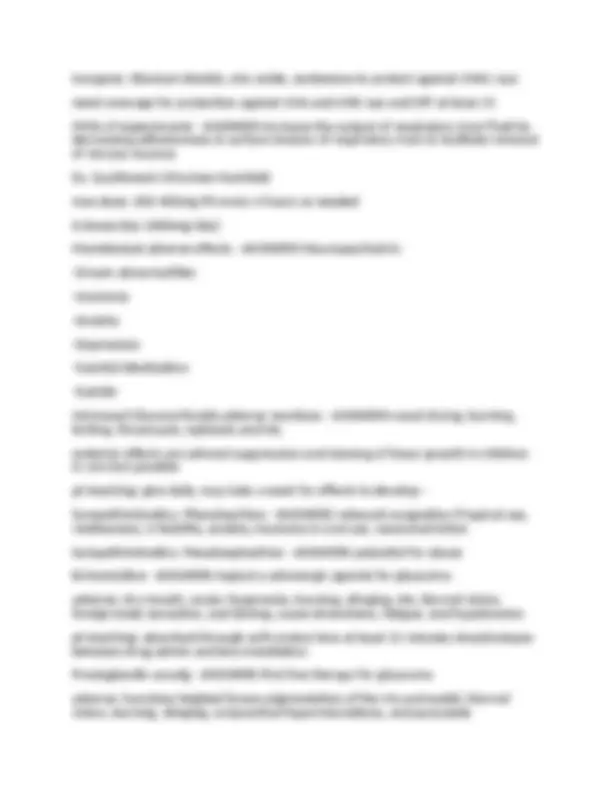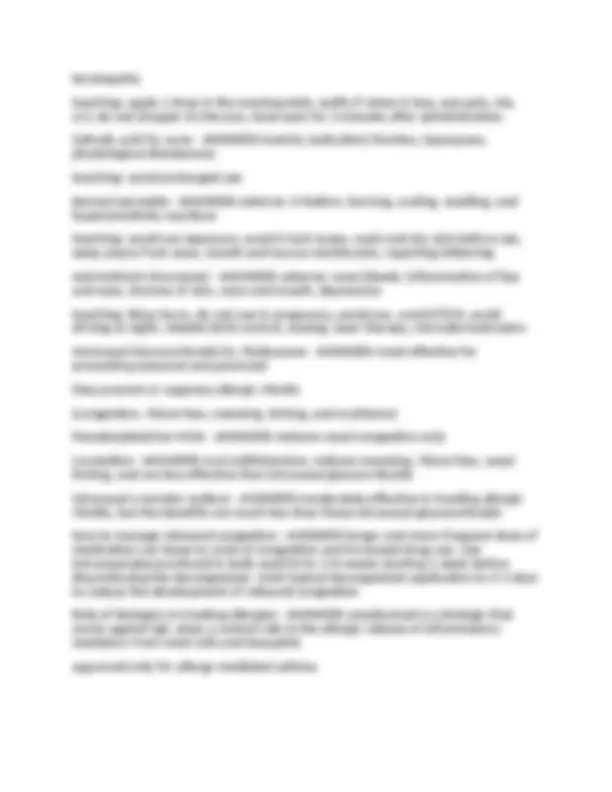




Study with the several resources on Docsity

Earn points by helping other students or get them with a premium plan


Prepare for your exams
Study with the several resources on Docsity

Earn points to download
Earn points by helping other students or get them with a premium plan
Community
Ask the community for help and clear up your study doubts
Discover the best universities in your country according to Docsity users
Free resources
Download our free guides on studying techniques, anxiety management strategies, and thesis advice from Docsity tutors
NR 566 / NR566 Chamberlain College Of Nursing -NR 566 Week 3 Questions With Complete Answers 2025 Latest Update Graded A+ Pass. NR 566 / NR566 Chamberlain College Of Nursing -NR 566 Week 3 Questions With Complete Answers 2025 Latest Update Graded A+ Pass.
Typology: Exams
1 / 4

This page cannot be seen from the preview
Don't miss anything!



Treatment of glaucoma- beta blockers - ANSWERS--approved for topical use in treating open-angle glaucoma are: Betaxolol, Carteolol, Levobunolol, and Timolol. -treat by reducing IOP which can slow or even stop the disease progression -lower IOP by decreasing production of aqueous humor Adverse reactions of Glaucoma Beta Blockers use - ANSWERS-local stinging, conjunctivitis, blurred vision, photophobia, and dry eyes -bradycardia and AV heart block can also occur -pulse should be monitored -use caution with HF pts- can cause bronchospasms How to treat someone with glaucoma and either asthma or COPD - ANSWERS-use only Betaxolol as treatment of choice because its a beta 1 selective S/S of Otitis media - ANSWERS-ear pain, fever, vomiting, anorexia, irritability, insomnia, and diarrhea bulging tympanic membrane, inflammation, and swelling of the eustchian tube treatment of otitis media - ANSWERS-Amoxicillin -heating pads help (alternate with ice) -avoid chewing (soft foods) -lie on the affected side -may not hear you -avoid smoke -May require PE (pressure equalizing) tubes to keep the middle ear drained. The ear tube (grommet) stays in about 6 months and then falls out Otitis Externa (Swimmer's Ear) Bacterial s/s - ANSWERS-An infection of the outer ear, with severe painful movement of the pinna and tragus, redness and swelling of pinna and canal, scanty purulent discharge, ear fullness common cause: pseudomonas aeruginosa and staph aureus Treatment for Otitis Externa: Bacterial - ANSWERS-pain relievers, ear drops of
acetic acid and alcohol, if this treatment fails give cipro drops oral meds is indicated if infection extends beyond the external auditory canal and involves the pinna. Give oral cipro in pts over 18 years and cephalexin (Keflex) in children Fungal/Otomycosis s/s Otitis Externa - ANSWERS-common pathogen: Aspergillus and candida intense itching and redness w/w/o pain or hearing loss Fungal/Otomycosis Otitis Externa Treatment: - ANSWERS-cleansing application of 2% acetic acid solution 3-4 times a day for 7 days. If treatment fails prescribe 1% clotrimazole (Lotrimin) drops twice daily for 7 days, if treatment fails prescribe oral antifungal such as itraconzole (sporanox) or Fluconazole (Diflucan) Treatment for Acne: mild - ANSWERS-Benzoyl Peroxide or topical retinoid (Vitamin A) or topical combo therapy of benzoyl peroxide plus antibiotic or retinoid plus benzoyl peroxide Treatment for Acne: Moderate - ANSWERS-topical combo Treatment for Acne: Severe (Two agents) - ANSWERS-oral antibiotics (Doxycycline or minocycline) and topical combo therapy of benozyl peroxide plus antibiotic or retiniod plus benzoyl or oral isotretinoin (accutane) side effect for Benzoyl Peroxide and retinoids: - ANSWERS-local irritation including burning, blistering, scaling, swelling and hypersensitivity reactions Side effects of isotretinoin (accutane) - ANSWERS-nose bleeds, inflammation of the lips and eyes, dryness of skin nose and mouth, high risk defects in fetus, do not use in pregnancy, and use protection the sunlight, avoid ETOH Treatment of eczema - ANSWERS-moisturizers and glucocosticoids (complications include skin atrophy, hypopigmentation, permanent focal red lesions, and high doses of adrenal suppression if those do not work topical immunosuppressants (tacrolimus and pimercrolimus) can be used - they can pose risk for skin cancer and lymphoma avoid tanning beds and sunlight, do use in prolong treatments Key Ingredients in sunscreen - ANSWERS-organic: aminobenzoic acid derivates, cinnamates, salicylates. benzophenones others: avobenzone, ecamsule, ensulizole, meradimate, octocrylene
keratopathy teaching: apply 1 drop in the evening daily. notify if vision is loss, eye pain, HA, n/v, do not dropper to the eye, close eyes for 3 minutes after administration Salicylic acid for acne - ANSWERS-toxicity (salicylism) tinnitus, hyperpnea, physiological distubances teaching: avoid prolonged use benzoyl peroxide - ANSWERS-adverse: irritation, burning, scaling, swelling, and hypersensitivity reactions teaching: avoid sun exposure, avoid irriant soaps, wash and dry skin before use, oeep aware from eyes, mouth and mucus membranes, reporting blistering Isotrentinoin (Accutane) - ANSWERS-adverse: nose bleeds, inflammation of lips and eyes, dryness of skin, nose and mouth, depression teaching: fetus harm, do not use in pregnancy, avoid sun, avoid ETOH, avoid driving at night, reliable birth control, waxing, laser therapy, microdermabrasion Intranasal Glucocorticoids Ex. Fluticasone - ANSWERS-most effective for preventing seasonal and perennial they prevent or suppress allergic rhinitis (congestion, rhinorrhea, sneezing, itching, and erythema) Pseudoephedrine MOA - ANSWERS-reduces nasal congestion only Loratadine - ANSWERS-oral antihistamine, reduces sneezing, rhinorrhea, nasal itching, and are less effective than intranasal glucocorticoids Intranasal cromolyn sodium - ANSWERS-moderately effective in treating allergic rhinitis, but the benefits are much less than those intranasal glucocorticoids how to manage rebound congestion - ANSWERS-larger and more frequent dose of medication-can lease to cycle of congestion and increased drug use. Use intranasal glucocorticoid in both nostrils for 2-6 weeks starting 1 week before discontinuing the decongestant. Limit topical decongestant application to 3-5 days to reduce the development of rebound congestion Role of biologics in treating allergies - ANSWERS-omalizumab is a biologic that works against IgE. plays a central role in the allergic release of inflammatory mediators from mast cells and basophils approved only for allergy-mediated asthma